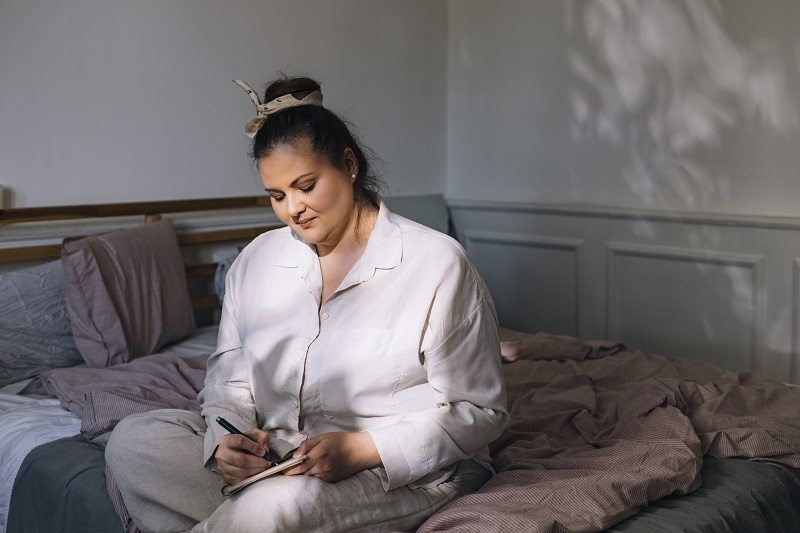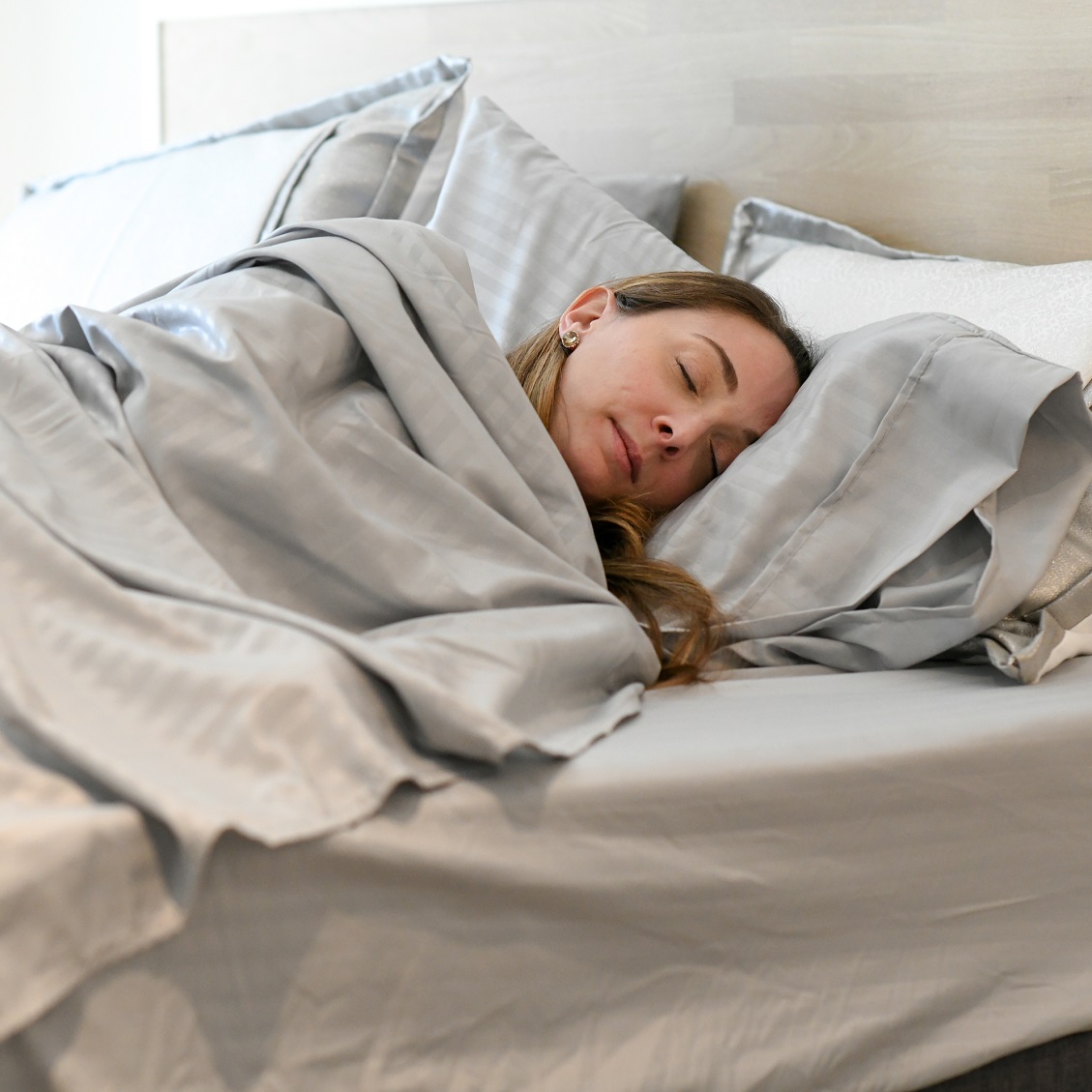Snooze Smarter: How a Sleep Diary Can Improve Your Sleep Habits

October 20, 2023
If you’ve been having trouble sleeping, whether it's waking up frequently in the middle of the night or not being able to fall asleep, a sleep diary can be a great way to understand your sleep patterns.
A sleep diary can be helpful for your health care provider to evaluate your symptoms and diagnose a possible sleep disorder or issue, but they can also be for your own benefit. Getting a good night’s sleep is important for your health as it can:
- Give your body time to rest and recover from day-to-day activities
- Boost your immune system
- Improve your ability to concentrate and focus
- Regenerate and increase your energy
- Help with emotional regulation
What is a sleep diary?
A sleep diary is a record of your sleep behaviors, quality and schedule. It can help you to gauge your total sleep time, mark your breaks in sleep and when they occur and track changes in your quality of sleep.
“Sleep diaries can also be used when preparing for an upcoming sleep study,” says sleep medicine expert and pulmonologist, David Goldstein, M.D. “Your entries can help to increase the accuracy of sleep study findings, as it can be used as a comparison to how you would ‘normally’ sleep. Sleep diaries are often more reliable and useful than a general recollection of your sleep behaviors, which can be helpful for your doctor when trying to reach a diagnosis.”
What are the benefits of keeping a sleep diary?
Keeping a sleep diary can help you to better understand your sleep hygiene. Recording your sleep habits can show whether you are getting enough sleep and help you to notice patterns in your sleep that could be contributing to its poor quality.
“If you suspect that you have a sleep disorder, a sleep diary can help your doctor to diagnose it. Sleep diaries are also often an important step when going into a sleep study, as they provide reliable information about your sleep to compare the data from your sleep study to,” says Dr. Goldstein.
Poor sleep can play a role in many health issues and concerns, not just sleep disorders. Keeping a sleep diary can also help your doctor evaluate whether you may have an underlying condition that is interfering with your sleep.
How do I use a sleep diary?
“The best time to fill out your sleep diary is in the morning, and ideally within an hour of waking up – the information will be fresh on your mind and you won’t forget it throughout the day,” explains Dr. Goldstein. “Even if you wake up during the night, wait until morning to fill out the diary. Putting on a light or actively thinking about your entry may make it harder to fall back asleep.”
There are many factors that a sleep diary can help you to track and record, including:
- The frequency of your sleep disruptions
- Whether you wake up during your sleep and how many times you do
- How long you stay awake after your sleep is interrupted
- The time you fall asleep and wake up in the morning
- Length of sleep
- How long it takes to fall asleep
- Rating of your sleep quality
- You can create a numeric scale of your own or use descriptions to show the variations in quality over time
Other factors can affect your sleep including the food you eat, what you drink and your overall physical and mental health. Additional questions to ask that may be useful to record can include:
- When did you eat dinner? And what did you eat?
- Did you eat anything before bed and when?
- Have you drank any caffeinated beverages or alcohol today?
- How are you feeling? Do you have any symptoms or feel sick?
Sleep diary formatting
Two practices that can help to start your sleep diary are the simple entry method and a sleep check-in. A simple entry can cover the basics of your sleep. This method can be especially useful if you don’t feel like you have enough time to make a sleep diary entry or if you are interested solely in recording your sleep habits. A sleep environment check-in can be helpful in gaining a fuller picture of your sleep, including information about the environment you are sleeping in.
A simple entry may look like this:
- When did I get into bed? 11pm
- When did I try to sleep? 11:30pm
- When did I actually fall asleep? Around 12:10am
- Did I wake up throughout the night? Yes
- How often? Three times (once to use the bathroom, once from a bad dream and the other was random)
- How long did it take me to go back to sleep?
- Bathroom: quick and easy, within a few minutes
- Bad dream: I stayed up for about 10 minutes scrolling through my phone to relax
- Random: about 10 minutes, was feeling restless
- When did my alarm go off? 8:30am
- How many times did I hit snooze before I got up? Twice
- When did I get out of bed? 9:05am
- What did I do when I got up? Use the bathroom, brush my teeth and then get dressed
- Quality of sleep rating (on a scale of 1-10, where 10 is waking up feeling reenergized and well-rested): 7.5, still a bit jittery from bad dream and feeling sleepy

Download our sleep diary template here.
You can also add additional information about what you did throughout the day, such as if you exercised, how much you worked vs. relaxed and whether you took any naps. Many of your daily activities can influence how tired you are when it's time for bed, as well as how well you can sleep. Those who take naps during the day may have more trouble falling asleep, while those who work out may feel more tired and fall asleep faster.
A sleep environment check-in may look like this:
- What temperature is the room I’m sleeping in?
- The ideal temperature for sleeping is between 60 and 70 degrees Fahrenheit
- How hot or cold do I feel throughout the night?
- In some cases you might be waking up because you are sweating in your sleep or feeling too cold, your body temperature can impact the quality of your sleep
- How much light is in my room?
- “Some studies have found that even a small amount of light exposure can lower melatonin levels and interfere with your sleep – so keep in mind if there are any light sources in your room, that could affect your sleep,” says Dr. Goldstein.
- Consider blackout curtains which can block natural light from entering through your windows, or a sleeping mask to cover your eyes
- How much noise is around you?
- If you live in a busy city, it could be difficult to fall asleep with the sounds coming from outside
- Consider earplugs or noise canceling devices that can help reduce the amount of noise that interrupts your sleep
- If you don’t like complete silence when sleeping, consider getting a sleep sound system or device that can emit calming noises such as ocean waves, or whatever else helps you to feel more comfortable
- Try to refrain from keeping your television on for noise as it can sometimes prevent you from falling asleep
- How relaxed do you feel?
- Diffusers or incense can help to create a relaxing environment for you to sleep in
- Consider scents such as lavender or lemon to soothe you
- Make sure to clean and change your sheets often as dirty sheets can sometimes keep you up at night due to the collection of dust, pollen or other things that can cause you to have adverse reactions
When to talk to your doctor
Many people have trouble sleeping occasionally, depending on different factors going on in their lives. However, if your difficulty sleeping is getting worse or unbearable, and you find yourself experiencing any of the following symptoms, it may be time to consult with your health care provider:
- You are falling asleep during the day or experience excessive daytime sleepiness
- You snore loudly and frequently
- You have trouble breathing while asleep and find yourself choking or gasping for air
- You spend long periods of time lying awake at night
- You wake up multiple times throughout the night
- You wake up feeling tired and not well-rested
- You wake up very early and cannot fall back asleep
Your quality of sleep can have significant impacts on your overall well-being. If you are not getting enough sleep or sleeping well, starting a sleep diary can help you to figure out what exactly is going wrong. If your difficulty sleeping persists, share your sleep diary findings with your doctor so they can get a better idea of what your sleep habits look like and develop a treatment plan to resolve your symptoms.
Next Steps & Resources:
- Our source: David Goldstein, M.D.
- To make an appointment with a sleep medicine expert near you, call 800-822-8905 or visit our website.
- Learn more about sleep medicine at Hackensack Meridian Health
The material provided through HealthU is intended to be used as general information only and should not replace the advice of your physician. Always consult your physician for individual care.






